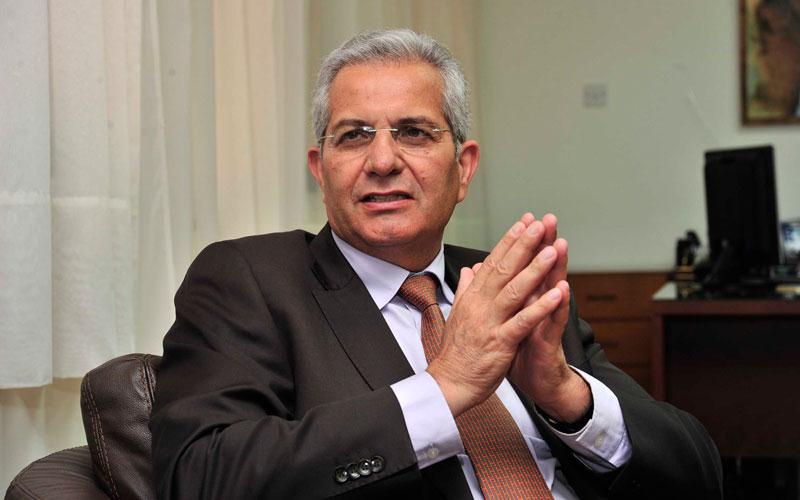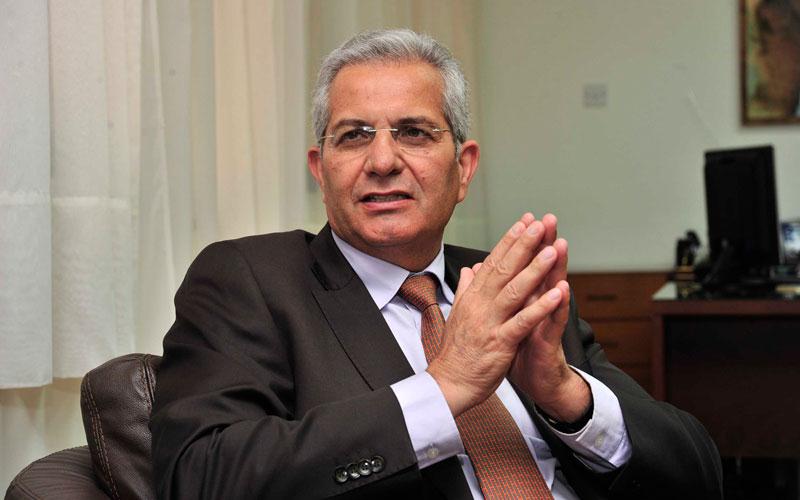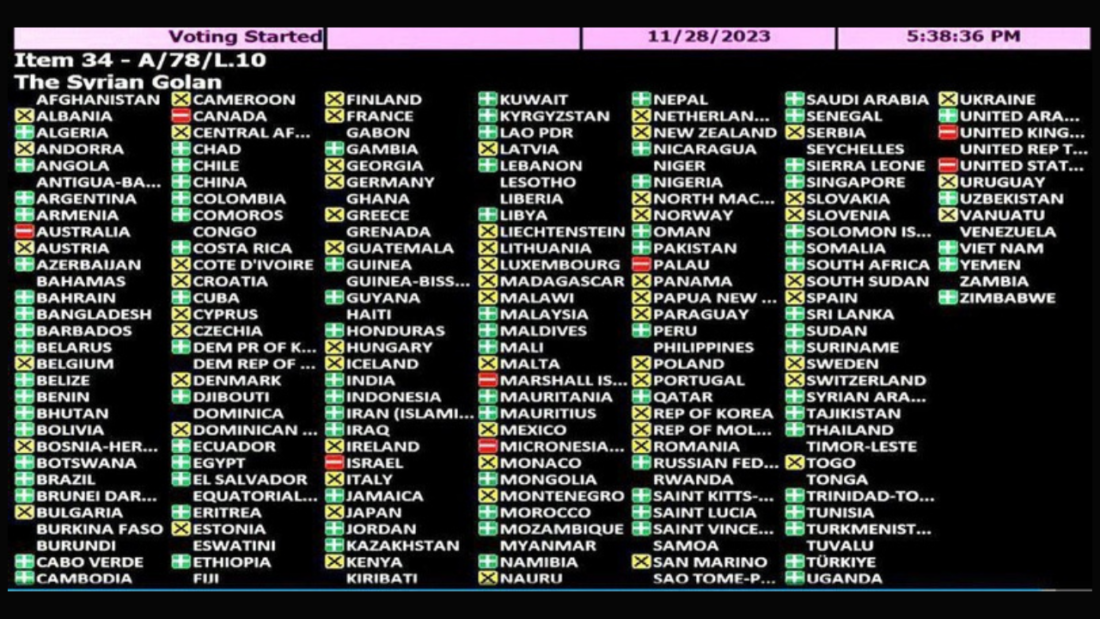
Interview with Andros Kyprianou, General Secretary of the C.C. of AKEL
“Politis” newspaper, Sunday 10th January 2016
 Do you believe that all this climate of optimism which has been created recently – and in particular after the assumption by M. Akinci of the leadership of the Turkish Cypriots – helps in the effort for a better negotiation or does that create excessive expectations that may disappoint?
Do you believe that all this climate of optimism which has been created recently – and in particular after the assumption by M. Akinci of the leadership of the Turkish Cypriots – helps in the effort for a better negotiation or does that create excessive expectations that may disappoint?
AK: The assumption by M. Akinci of the leadership of the Turkish Cypriot community has improved the climate, but it would be wrong to overly optimistic. We are in a phase where we are debating a very crucial and decisive issue for the entire procedure, that is to say the property issue on which there has been no agreement so far, and this issue in itself could cause serious problems to the negotiation. This is the reason why I think we should be very cautious and we don’t need in my view many public statements to be made.
You have said several times lately that it’s good for the two leaders to talk less. Why;
AK: I think when each leader addresses their community, he will inevitably say things that will provoke reactions in the other community, and this, in my opinion, complicates the negotiation procedure, whilst also causing reactions from political parties. It would therefore be better if fewer statements were made for the two leaders to focus their attention on this at the negotiating table.
Do you consider that the public statements create commitments that might be difficult to reverse at the negotiating table?
AK: That’s also a problem, namely for someone to state publicly a position at this critical stage certainly creates commitments towards public opinion or the political parties and makes the showing of flexibility in order to reach an agreement difficult. The less said the better.
Though AKEL by nature and its position is in opposition the parties of the intermediate political spectrum consider that because of its stand on the Cyprus problem, AKEL operates more or less as a force supporting the government in collusion with the DISY party in order to lead developments towards a harmful solution.
AK: AKEL’s positions on the solution of the Cyprus problem are concrete and long-standing and have been boldly set out during the five-year term of Demetris Christofias. Then, starting in 2009, we came under a devastating attack from all sides. However, we did not change our positions and policies because AKEL believes that without a solution of the Cyprus problem our homeland has no future and a perspective for the future. Without a solution of the Cyprus problem there will not be peace, which is essential for the prosperity of the people of Cyprus as a whole. AKEL as a patriotic and responsible party will not change its positions depending on whether it is in/supporting a government or in opposition. AKEL will not behave as other political parties and forces behaved in the past, who were guided by petty-party and electoral considerations and expediencies. AKEL is fully aware that this is a very critical period for the future of our country and people and will behave patriotically and responsibly.
You are being accused that you are contributing together with DISY to lead the Cyprus problem towards a solution that will not be beneficial.
AK: AKEL insists on a solution based on principles; a solution, however, as we have agreed to it. AKEL does not speak of a bi-zonal bi-communal federation but means a unitary state – and this is clear in everybody’s mind. AKEL, when it speaks about a bi-zonal bi-communal federation, it means a bi-zonal, bi-communal federation with political equality, which would result in a single state that will be the transformation of the Republic of Cyprus and will have a single and indivisible sovereignty, a single international personality and a single citizenship.
Other parties are saying that they too are seeking a bi-zonal, bi-communal federation.
AK: They don’t say it. In relation to the substance, the proposals they are submitting refer to a unitary state. I heard a political leader calling on AKEL to state its position on the issue of the transformation of the Republic of Cyprus. AKEL has stated its position hundreds of times, and in a clear way. I think most of the things said are done in an effort to influence public opinion. Goebbels said that the bigger the lie, and the more it is repeated, the more believable it becomes. I consider that some people follow this tactic as regards AKEL’s positions. They say something hoping that something will stick in the minds of the people and that they will be able to gain some petty-party benefits. AKEL, as it withstood the devastating criticism exerted on Demetris Christofias, will also today withstand the criticism and not yield to the unsubstantiated charges against it.
However, it should be noted that our differences with the Turkish Cypriot community, as one might conclude from the statements issued by Akinci, are still significant. Indeed, some of them do not refer to what our side has accepted as a bi-zonal, bi-communal federation.
AK: I want to say that since 1977 we have agreed to a concrete framework of a solution of the Cyprus problem, which since then all the Presidents of the Republic have reaffirmed. All our friends in our international community say that this is the framework through which we should try to solve the Cyprus problem and they warn us that if we try to abandon it, we will pay the price and that the process for the recognition of the pseudo- state will commence. I regret to say that opinions are being heard referring to a unitary state. If only we could go to a unitary state, but unfortunately we cannot. There is also the Turkish Cypriot community, which cannot be ignored, as well as the international commitments that cannot be ignored. Certain circles and forces with the views they are submitting are in effect saying that we should not discuss with the Turkish side because there is the danger of them trying to impose something bad and therefore we should let things evolve. We disagree with this approach and I want to remind you that when we are not discussing, Turkey took steps forward.
Which period are you referring to?
AK: I’m not going to go too far back. I will refer to 2006 when we got stuck on procedural grounds after the 8th July. There were 50 meetings held between Tasos Tzionis and Rasit Pertev (Note: the representatives of the Greek Cypriot and Turkish Cypriot leaders back then) without them reaching an agreement on the procedure for the resumption of the dialogue. And what was the result? Unbelievable pressure was brought on us for the direct trade of the occupied areas with the EU and a decision was approved to grant annual financial support to the Turkish Cypriot community amounting to 239 million euros.
Yes, but back then you supported the Papadopoulos government and participated in it.
AK: We had a different view which we stated and this is precisely the reason why we clashed back then with leading members of the governing Democratic Party DIKO and EDEK. I consider that this was also the reason why AKEL decided in the 2008 presidential election to fight for the presidency with its own candidate.
Returning to the issue of Mr. Akinci’s public statements…
AK: It is true that some of his positions concern and worry us. Does this mean that we should launch devastating attacks on Mr. Akinci? No, no way.
Do you think that these positions can be altered at the negotiating table?
AK: Yes, we think they can be changed. We are discussing with Turkish Cypriot parties and we are convincing. For example, on the issue of guaranteed majorities in property and population I think we can convince them of the correctness of our positions that these things cannot be done. We have the EU on our side on these matters. There are difficulties and there will still be difficulties. The recipe is neither to surrender, nor end the negotiations. We must concentrate all the arguments we have and try to convince them of the correctness of our positions.
Mr. Bozkir (Note: Turkish Minister of EU Affairs) a few days ago claimed that there should be permanent derogations and that the solution of the Cyprus problem should become EU primary law.
AK: We disagree and will not accept such a development. I reiterate that the EU shares our own opinion and does not accept such permanent derogations from the acquis communautaire.
How come you decided to accept the invitation extended by Mevlüt Çavuşoğlu (Note: Minister of Foreign Affairs of Turkey) and go to “the court of Artaxerxes” to use the expression that is used by those vehemently oppose to such meetings…
AK: I will not go to the “court of Artaxerxes,” but to Istanbul, which I have gone to 7-8 times so far as a guest of Universities, but also of the Communist Party of Turkey and the Party of Freedom and Democracy. I think that it would be a serious mistake to reject an invitation to discuss the Cyprus problem.
Have you wondered the reason why he invited AKEL?
AK: I think it’s because AKEL plays an important role in the developments for a solution of the Cyprus problem and this is recognized by the international community and Turkey. I know Mr. Çavuşoğlu from the period when we were together in the Parliamentary Assembly of the Council of Europe (PACE). My own desire is to discuss the important chapters on where convergences do not exist so that we can see what the Turkish side’s approach is. I do not know what Mr. Çavuşoğlu expects. I think it is important to talk with Turkey on some very important issues and we fully realize the responsibilities AKEL assumes for the realization of such a meeting.
Are you in consultation with the President of the Republic?
AK: Of course we are. We have talked and we shall meet to discuss matters before the 23rd of this month, the date of the scheduled meeting.
One of the key issues that directly concern Turkey is the issue of the guarantees which Mr. Akinci and Ankara insist on.
AK: I think a crack has opened up which should be fully exploited. The fact that Mr. Akinci and Mr. Çavuşoğlu have stated that they are ready to discuss these issues creates a certain very limited optimism. We should use this crack and try to convince them of the correctness of our approach.
As we have referred to the issue of the guarantees, how do you view the possibility of guarantees from NATO?
AK: AKEL has made it very clear from the outset that it is against any NATO guarantees. We are pleased that today this no longer seems to be discussed.
Certain parties argue that you and DISY receive privileged information from the President of the Republic. Is this true?
AK: We know what they and the other parties know. We however do something else. We also talk with the Turkish Cypriot political parties and verify information. The President of the Republic briefed in detail on where things stand during the last meeting of the National Council (Note: an advisory body to the given President of the Republic on the Cyprus problem composed of all the parliamentary parties and former Presidents established after the coup d’état and Turkish invasion of July 1974 by the late President Makarios) and all that we know the other political parties know too. These are lame excuses that certain parties find just so they can criticise.
Is it difficult for you that on the one hand you support the handling of the Cyprus problem and on the other you are in opposition to the rest of the government’s policies?
AK: As I said before, AKEL is a responsible and patriotic party. On matters concerning internal governance and moreover regarding the economy we follow a policy that serves the interests of the Cypriot people. A different policy must be implemented other than the one pursued by the Anastasiades government, which patently serves and reflects the interests of the privileged and select few. The gap between the privileged rich and the majority of the people who are lower income groups and represent 90% of society is growing. The richest 10% of Cypriot society have seen their incomes and revenues grow by 3.5% in the last three years, while the remaining 90% have seen a fall in their incomes by 8%. According to figures released by “Eurostat” we are the country with the greatest social inequality. It is a fact that the policies pursued by the government are against the people’s interests.




